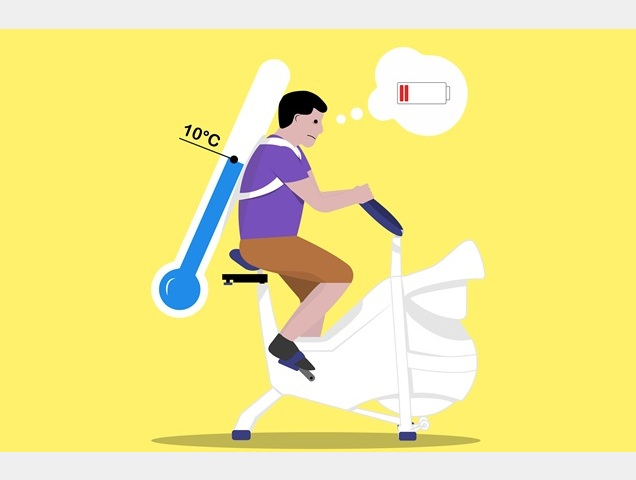Research News
Sep 19, 2025
- Research Centers
Physically cold, mentally strained
Combined effects of body cooling and mental fatigue hinder endurance performance
Exercising after cognitive tasks
Participants completed strenuous mental tasks while wearing a body cooling suit.
Credit: Osaka Metropolitan University

Performance in endurance sports, such as long-distance running, cycling, and cross-country skiing, requires sustained activity over prolonged periods of time, and is influenced by multiple factors, such as temperature and mental state.
In chilly temperatures around 10°C (50°F), endurance performance has been shown to improve in certain circumstances. In contrast, extreme cold can slow down muscle and nerve function and cause a decline in performance. Such reactions suggest the involvement of the Sympathetic Adrenal-Medullary (SAM) system, a stress response pathway. Further performance decline can be attributed to mental fatigue caused by psychological pressure, which leads to decreased motivation and increased fatigue. In hot environments, mental fatigue has been shown to act through the Hypothalamic-Pituitary-Adrenal (HPA) axis, another stress response pathway that may be involved in performance decline.
However, the simultaneous effects of cold and mental fatigue have rarely been studied. Therefore, a research team led by Associate Professor Daiki Imai at Osaka Metropolitan University’s Research Center for Urban Health and Sports conducted a study on nine healthy young men that induced mental fatigue through Stroop color-word tasks while cooling their entire bodies. Their endurance during exercise was evaluated with a detailed focus on subjective fatigue and stress response relationships.
Results revealed that no difference in endurance exercise performance was observed between conditions. However, when analyzing individual levels, it became clear that those who experienced increased subjective fatigue showed a decrease in endurance exercise performance. Furthermore, the SAM system seemed to be involved in the increase in fatigue rather than the HPA axis.
“The results of this study provide a scientific basis for effective conditioning strategies for winter sports and work in cold environments,” stated Professor Imai. “Going forward, we will establish specific methods to minimize the effects of cold stress and mental fatigue. Further, we will investigate the characteristics of individuals who are susceptible to these effects.”
The study was published in European Journal of Applied Physiology.
Paper information
Journal: European Journal of Applied Physiology
Title: Mental fatigue accompanied by whole‑body surface cooling is associated with the impairment of subsequent endurance exercise performance
DOI: 10.1007/s00421-025-05895-y
Authors: Daiki Imai, Ryosuke Takeda, Eriko Kawai, Kosuke Saho, Akemi Ota, Emiko Morita, Yuta Suzuki, Hisayo Yokoyama, Kazunobu Okazaki
Published: 11 July 2025
URL: https://doi.org/10.1007/s00421-025-05895-y
Contact
Daiki Imai
Research Center for Urban Health and Sports
Email: imai[at]omu.ac.jp
*Please change [at] to @.
SDGs

